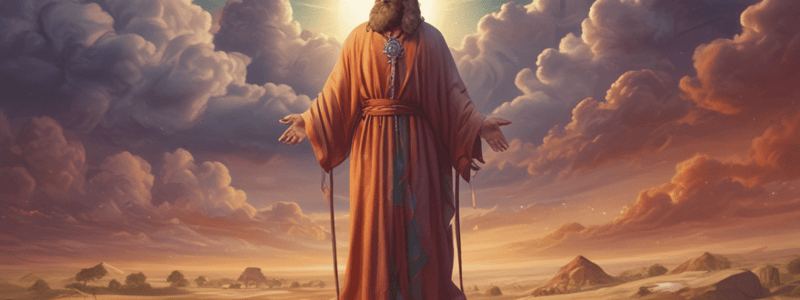Podcast
Questions and Answers
How many prophets have their own books in the Bible?
How many prophets have their own books in the Bible?
- 20
- 10
- 25
- 15 (correct)
What is the covenant in the context of the prophets?
What is the covenant in the context of the prophets?
- A promise made by the prophets
- A mutual partnership between God and the Israelites (correct)
- A prophecy about the end of the world
- A set of rules for the Israelites to follow
What is the primary role of the prophets?
What is the primary role of the prophets?
- To announce the consequences for breaking the covenant
- To remind Israel of their role in the partnership with God (correct)
- To perform symbolic stunts to communicate their message
- To predict the future
What is 'The Day of the Lord'?
What is 'The Day of the Lord'?
How did the prophets care about the present and the future?
How did the prophets care about the present and the future?
Why were the prophets' writings later studied and arranged?
Why were the prophets' writings later studied and arranged?
What kind of literature are the prophets' writings an example of?
What kind of literature are the prophets' writings an example of?
How did some prophets communicate their message?
How did some prophets communicate their message?
Study Notes
Understanding the Prophets
- 15 prophets have their own books in the Bible, including Ezekiel, Obadiah, and Habakkuk
- Biblical prophets are not just fortune tellers, but Israelites who had a radical encounter with God's presence and were commissioned to speak on God's behalf
The Covenant
- The covenant is the mutual partnership between God and the Israelites
- God rescued Israel from slavery in Egypt and invited them to become a nation of justice and generosity, representing God's character to the nations
- The covenant required all Israelites to give their trust and allegiance to God alone
The Prophets' Role
- The prophets reminded Israel of their role in the partnership and accused them of violating the covenant (e.g., idolatry, alliances with other nations, injustice towards the poor)
- They called the Israelites to repent and turn back to God
- They announced the consequences for breaking the covenant, known as "The Day of the Lord"
The Day of the Lord
- The Day of the Lord is not just about the end of the world, but about God's justice on Israel's corruption and on the violent nations around them
- The prophets used cosmic imagery to describe these events, showing how they fit into the bigger story of God's mission to bring down corrupt and violent nations
- The Day of the Lord is bad news for those who are part of Babylon, but good news for those waiting for God's kingdom
The Prophets' Message
- The prophets cared about the present and the future
- They used cosmic poetry to describe events, such as the return of the exiles to Jerusalem and the establishment of a new Messianic King
- The prophets' message was one of warning and hope, showing how God would turn Israel's tragic story into one of hope and restoration for all nations
The Prophets' Lives
- Some prophets were powerful, persuasive speakers, while others lived on the margins and performed symbolic stunts to communicate their message
- The prophets were often shunned by Israel's leaders, and their writings were a form of resistance literature
- The prophets' works were later studied and arranged by unnamed prophets to create the Hebrew scriptures
Understanding the Prophets
- 15 prophets have their own books in the Bible, including Ezekiel, Obadiah, and Habakkuk
- Biblical prophets were Israelites who had a radical encounter with God's presence and were commissioned to speak on God's behalf, differing from fortune tellers
The Covenant
- The covenant is a mutual partnership between God and the Israelites, established after God rescued Israel from slavery in Egypt
- The covenant's purpose is for Israel to become a nation of justice and generosity, representing God's character to the nations
- The covenant requires all Israelites to give their trust and allegiance to God alone
The Prophets' Role
- Prophets reminded Israel of their role in the partnership and accused them of violating the covenant through actions like idolatry, alliances with other nations, and injustice towards the poor
- They called the Israelites to repent and turn back to God
- They announced the consequences for breaking the covenant, known as "The Day of the Lord"
The Day of the Lord
- The Day of the Lord is about God's justice on Israel's corruption and on the violent nations around them, not just the end of the world
- The prophets used cosmic imagery to describe these events, showing how they fit into the bigger story of God's mission to bring down corrupt and violent nations
- The Day of the Lord is bad news for those who are part of Babylon, but good news for those waiting for God's kingdom
The Prophets' Message
- The prophets cared about the present and the future, using cosmic poetry to describe events
- They described events like the return of the exiles to Jerusalem and the establishment of a new Messianic King
- The prophets' message was one of warning and hope, showing how God would turn Israel's tragic story into one of hope and restoration for all nations
The Prophets' Lives
- Some prophets were powerful, persuasive speakers, while others lived on the margins and performed symbolic stunts to communicate their message
- The prophets were often shunned by Israel's leaders, and their writings were a form of resistance literature
- The prophets' works were later studied and arranged by unnamed prophets to create the Hebrew scriptures
Studying That Suits You
Use AI to generate personalized quizzes and flashcards to suit your learning preferences.
Description
Explore the concept of biblical prophets, their role, and the covenant between God and the Israelites in the Bible.




